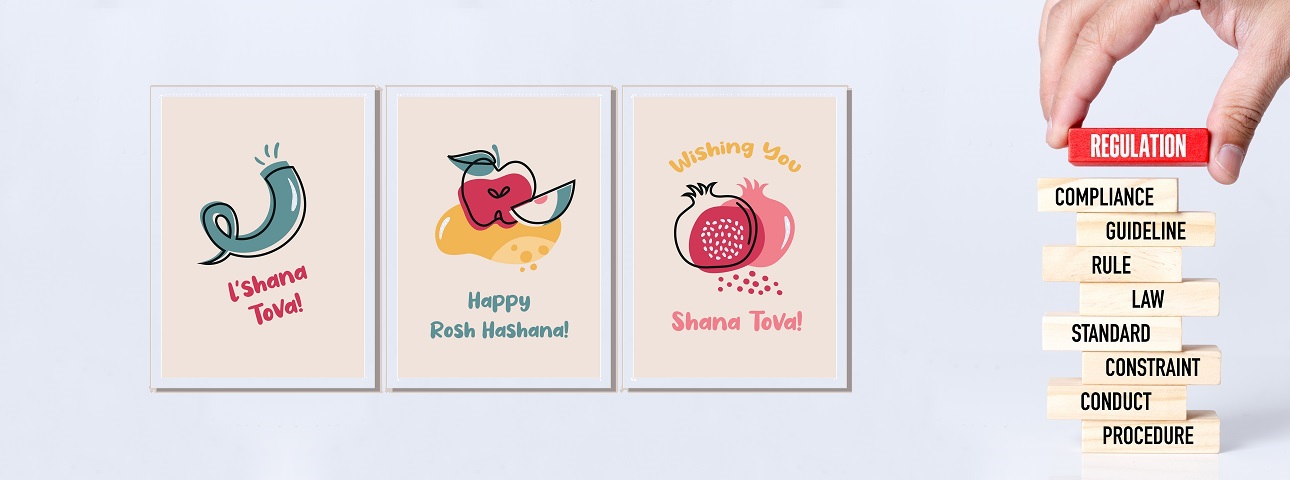“Regulations” for the New Year
On the eve of the Jewish New Year, what can we wish for regarding Israeli regulatory policy? Here are some possible policy proposals.

The term “regulation”—which we applaud but demand that it be minimized, relates to laws and rules applied to markets and other specific arenas. “Regulatory policy,” is a relatively new concept which has been developed to assess the quality of that policy, mainly in organizations such as the OECD. For example, the World Bank’s Global Indicators of Regulatory Governance evaluates processes for creating regulations, and the OECD’s Indicators of Product Market Regulation examines the extent to which different types of regulations promote or impede competition. In Israel, the past year has seen the establishment of a new body, the Israel Regulation Authority (IRA), charged with ensuring that those who design and introduce regulations select the most appropriate arrangements, but also provide consulting and training services to make regulators aware of the consequences of their decisions.
Q: On the eve of the Jewish New Year, what can we wish for regarding Israeli regulatory policy?
1. More learning, staff work, and research: There is no substitute for high-quality in-house research to present decision-makers with organizational memory, analysis and comparisons with what is being done by neighboring regulatory authorities.
2. More discussions to confirm or refute the worthiness of these alternative regulations. It makes no sense to “assess the impact of regulation” or to analyze the costs and benefits of regulation, if the alternatives are similar to one another and do not call into question initial assumptions. Rather, one aims to expand the boundaries of regulatory imagination. Success in this requires broad familiarity with the regulatory toolbox. For example, what are the advantages of licensing? When is mandatory reporting preferable to mandatory disclosure? When is hard licensing necessary? And when is “silent approval” sufficient to encourage entrepreneurship?
3. More methodological assessment of the impact of regulation, to compare processes among different sectors. For example: When should economic considerations be applied? When do security considerations override concerns about rights? And what is the role of environmental protection or competition?
4. More reliability in the use of “data”. There is no value in using “data” only to justify policy decisions post factum, rather than approving or ruling out alternatives before decisions are made. Similarly, making manipulative use of data with computational methods and cherry picking what is presented, has become major problems in regulatory design. More professionalism is needed in data analysis, but even more so, we need more credibility and integrity. From quantitative data of carbon emissions, to the number of cyberattacks, to Covid-related health events, to financial credit standing, precision and objective context are vital.
5. More risk management (and risk-taking). Regulation is intended to mitigate risks to the public, but attempting to completely prevent any risk would paralyze industry. Giving too much weight to risks is natural given that governments and corporations are slow and risk averse. Given the fear of public criticism, which always focuses on the bridges that collapse rather than bridges that remain standing, it requires courage and leadership to manage risks in a responsible bit appropriate manner. This is a challenge that one cannot escape.
6. More post-factum assessment. Besides assessing impact and weighing parameters, it is sometimes necessary to take a sober look at what happens to a piece of regulation when it comes up against reality. Even if much time and thought has been invested, if the by-products of regulation are problematic, it should be sent back to the drawing board.
7. More transparency. -Transparency in the sense of an ongoing, deep, and respectful discourse with all external actors to ensure that those who created the regulations are still focused on the needs of citizens and of small businesses, not only of the lobbyists for the powerful. Holding a periodic (quarterly) roundtable discussion seems reasonable.
High-quality regulation must rest closely on legislation, both in the substantive sense of the democratic authority to regulate, and in the sense of the basis for enforcement. The endless rounds of elections have paralyzed the Knesset. Along with the insufferable delays to legislative processes, this has led to “regulators” providing wide-ranging interpretations to existing legislation, instead of bringing issues for discussion and approval by the “legislators”.
Collaboration among different regulators is required. Our complex world requires more interdisciplinary regulation, But the bottleneck created by the miserly unwillingness of regulators to share information and the fundamental lack of cooperation erects barriers that must be removed.
It is easy to set rules, but difficult to oversee and encourage compliance. However excellent a piece of regulation may be, if it is executed poorly then it will have terrible results. Enforcement requires more services to the public, quick-footed responses to requests, and implementation of digital tools for communicating with those subject to regulation. It requires courage and the willingness to confront those subject to the regulations. The regulator must be able to project an image of power that is recognized and respected by the government.
One requires fewer color brochures with annual reviews, but more ability to address important and crucial issues. Does the regulation in question look to the future? Is it optimal and focused on proper use of resources?
One needs people in government ministries and “legislators” to relinquish the budgets, power and habits they are used to. They must agree to have their ”cheese moved”. Until that happens, we will continue to look in despair at the OECD indicators and only continue to write more policy papers.
Most importantly: Everything must be done more quickly .
May the coming year be a good one and bring positive change.
